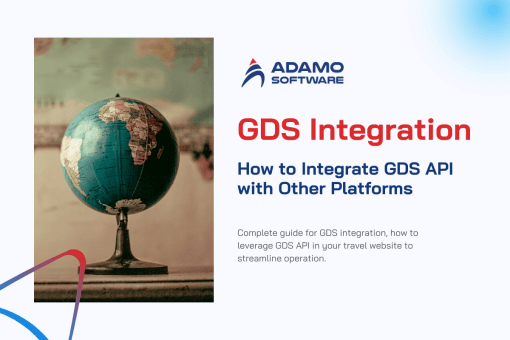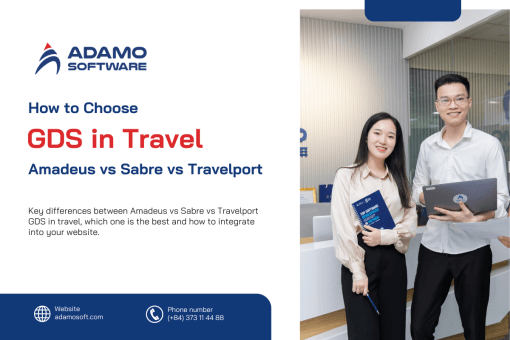Guide to Build Online Booking Engine for Hotels, Airlines and Travel
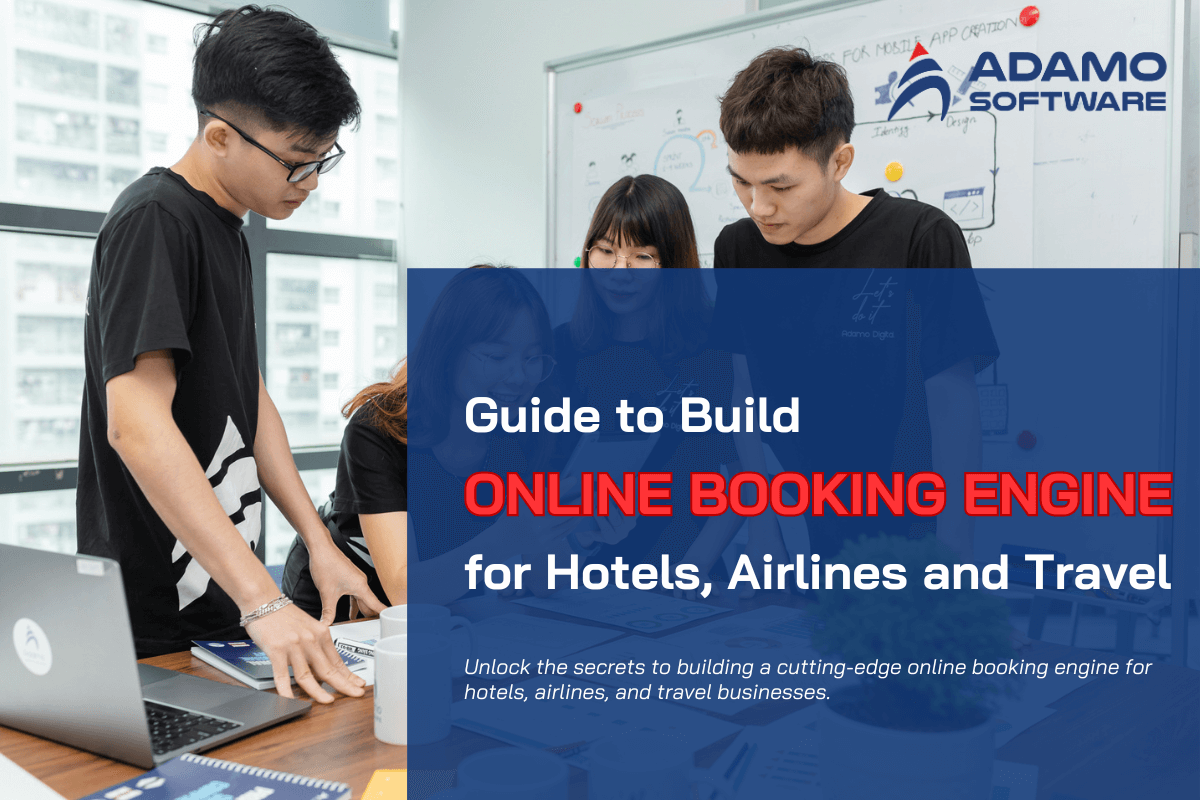
Today’s travelers value the ability to plan and prepare for their trips with just a few clicks. That’s why every business aims to provide its customers with a state-of-the-art online booking system. However, it’s not just about finding effective software; it’s also crucial to have the right online booking engine in place.
An online booking system is web-based software that enables travel providers to offer their services for online reservations. It allows travel businesses to streamline the booking process for their customers.
Now, let’s dive in and unlock the secrets to building a cutting-edge online booking engine for hotels, airlines, and travel businesses to achieve greater success in the ever-evolving travel industry.
I. Online booking system: market size & growth
Online booking engine, in just a few years, has completely changed the way travel reservations are taken in. Travel businesses and tour operators have also been able to save countless hours of administrative work thanks to travel booking engine.
A look at how online booking system has performed thus far
– Online travel booking had a 521 billion USD market size in 2023 and this figure is predicted to hit 1 trillion USD in 2030.
– Around 148.3 million travel books are made online annually.
– 80% of travelers book their holidays online.
– By June 2023, travel app logins were 87% higher than by the end of 2019.
– In 2023, 48% of users researched destinations on their mobile device, 47% compared costs for travel and lodging, and 40% made hotel and flight reservations.
– 45% of tourists said they would rather plan their entire trip on a single website that offers choices for lodging, airfare, rental cars, and extras.
– 70% of travelers indicated they would book through an OTA if hotel websites and OTAs had the same costs.
II. Online booking engine: key features and integration
1. Online booking engine of main functions
Capture and process direct online reservations
The primary function of an online booking engine is to capture and process direct online reservations. This means that customers can visit a website or mobile app and make their bookings directly without the need for intermediaries.
Online booking system allows users to browse available options, select their preferred dates, choose from various room types or flight options, and complete the reservation process seamlessly. It collects all the necessary details, such as customer information, reservation dates, and preferences, and securely processes the reservation.
Cross-selling
Another important function of an online booking engine is cross-selling. This feature allows travel companies to offer additional products or services to customers during the booking process.
For example, when a customer books a flight, the booking engine may suggest adding a hotel or car rental to their itinerary. This helps increase revenue for the travel company by encouraging customers to purchase multiple products or services in a single transaction.
Manage discount and promo codes
Online booking engine also allows customers to enter these codes during the booking process to avail themselves of the discounts or promotional offers. The engine verifies the validity of the code and applies the corresponding discount to the reservation, ensuring that customers receive the benefits they are entitled to.
Send confirmation emails
Once a customer successfully completes a reservation through the online booking engine, the system automatically generates and sends a confirmation email. This email serves as proof of the booking and includes essential details such as the reservation confirmation number, travel dates, booked services, payment information, and any additional instructions or terms and conditions.
Sending confirmation emails helps customers know exactly that their reservation is confirmed, and their travel plans are in order.
Secure payment process
All customers need to feel confident that their payment information, such as credit card details, is handled securely. The booking engine utilizes encryption and secure payment gateways to ensure the protection of sensitive information. It allows customers to make online payments without concerns about data breaches or unauthorized access, providing a seamless and secure booking experience.
2. Online booking engine integration
Travel content mapping
Travel booking engine encounters the issue of duplication in search results when they gather data from various channels, which is typically the case. The reason for this is inconsistent data from many providers, including bed banks, consolidators, hotels, GDSs, and so on.
Therefore, multiple names may be listed for the same room or other inventory items. Online booking engine must process inventory listings using internal or external mapping tools to fix this problem.
Integration with payment gateways
Travel booking engine can integrate with payment systems to make it easy for guests to check out seamlessly and for hotels to manage payments in compliance with industry guidelines.
Multi-language and currency options
Modern online booking system can offer multi-language and currency options to cater to international travelers using multiple different languages.
Social media integration
Integration with social media platforms allows travel providers to sync inventory, availability, and content with their social media pages.
Property management system integration
An online booking engine can integrate with a property management system (PMS) to access and manage bookings, as well as to compare direct reservations with third-party bookings.
You can get a better understanding of flight booking process – airline ticketing here
III. Business model of online booking model
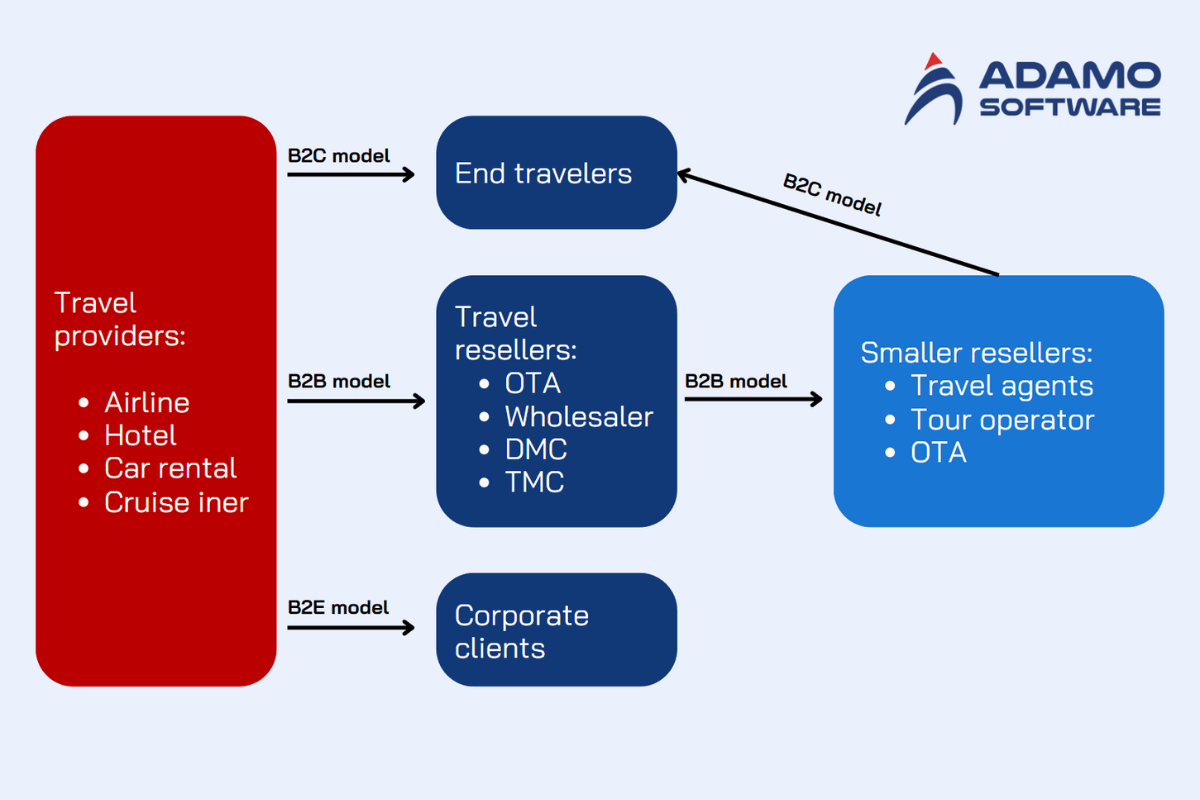
1. B2C Model for end-users
In the B2C model, end users have the ability to directly book travel products. This type of booking engine is utilized by airline and hotel websites, hotel booking systems, online travel agencies (OTAs), and other retailers. In addition to the functions mentioned above, online booking systems in the B2C sector typically offer important features to ensure success:
– Mobile-friendly interface
– Shopping cart integration
– Travel products promotion based on customer booking history
– Notifications upon booking confirmation
2. B2B Model for travel resellers
B2B online booking engine is utilized by travel wholesalers, destination management companies, and large online travel agencies (OTAs) that have a vast inventory to sell products and services in bulk to other businesses, such as smaller travel agencies or corporate clients. This arrangement allows buyers to take advantage of specially negotiated rates that are not available in the B2C scenario. B2B booking engines also offer some additional functions, including:
– Flexible markup and commission settings
– Ability to make bookings without instant payments, within a credit limit
– Generation of PDF documents for booking confirmation with a reseller’s logo
Smaller agencies, who are the B2B clients, can access Global Distribution Systems (GDSs) by using the credentials of the B2B booking engine’s owner (the host agency). This enables them to save on expensive contracts and eliminates the need to invest in ARC (Airline Reporting Corporation) or IATA (International Air Transport Association) accreditation, which authorizes companies to issue flight tickets. Instead, the host agency will handle these tasks on behalf of the smaller agency.
3. B2E model for corporates
Corporate online booking systems cater to the needs of travel management companies and their customers, which are typically enterprises. These systems are powered by a Business-to-Employee (B2E) booking engine, which allows employees to book business trips on behalf of their corporation at negotiated prices.
These platforms are designed to adhere to the organization’s travel policy, with business rules that are configured based on factors such as employee status, including spending limits and other restrictions to ensure compliance with the company’s travel policies.
IV. How can online booking engine help direct suppliers in hotels, airline and travel
1. Flight booking engine
An air online booking engine serves as a vital component of an airline reservation system and the overall passenger service system (PSS). However, it can also function as a separate module that integrates with any airline reservation system through an API. In addition to its primary tasks of searching for available flights, processing results, confirming bookings, and emailing passenger details such as PNR, itinerary, and ticket information, an advanced airline booking system offers the following features:
– Integration with bed banks, hotels, GDSs, and other travel suppliers to combine flights with third-party products
– Seat selection functionality for passengers
– Inclusion of ancillary services during the booking process
– Customization of booking flows and deals based on client data
– Support for frequent flyer programs
One crucial aspect to consider when selecting a flight online booking engine and an airline online booking system is the connectivity to the New Distribution Capability (NDC). This capability allows airlines to provide comprehensive information about their products and sell flights directly to multiple travel companies, bypassing the need for GDS mediation. Here are some providers that offer NDC-enabled travel booking engines for airlines:
– ISO Software Systems: Their sell booking engine complies with IATA NDC Level 4 and ONE Order standards.
– Airlines Technology: Combines their B2B booking engine with a PSS adapter that converts all offers generated by the PSS into NDC-compliant standards. The booking engine integrates with OTAs, TMCs, and other IATA and non-IATA resellers, creating a direct distribution network.
– Pribas’s Airline Distribution Platform: Based on One Order concepts, this platform includes a booking component to sell flights, ancillaries, and third-party products.
– InteRES: Offers a PSS-agnostic Airline Retail Engine that enables airlines to leverage the potential of NDC and ONE Order.
Want to gain more insights about flight booking engine, read here
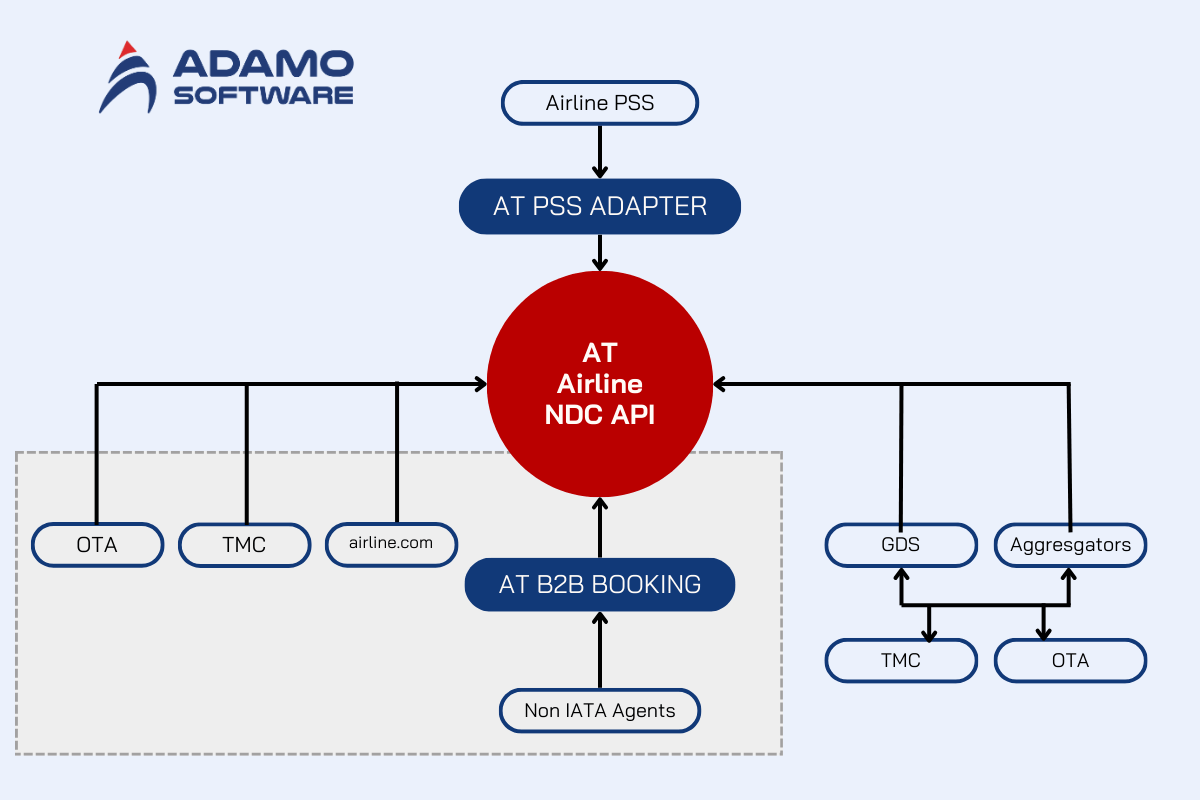
2. Hotel booking engine
A hotel booking engine is an essential component of a Property Management System (PMS) and works in tandem with a channel manager to handle hotel reservations from various distribution channels. Its primary function is to capture and process direct online bookings made through the hotel’s website. A hotel booking engine also offers several other important features, including:
– Integration with the hotel’s social media pages, allowing guests to make reservations directly from those platforms
– Cross-selling with promotion of additional services to enhance the guest experience.
– Discount and promo code management
– Displaying rate comparison with OTAs
– Automated email communication such as confirmation emails, pre-arrival information, and post-departure follow-ups to guests
Several providers offer hotel software with a booking engine module that can be integrated into an existing PMS or website. Here are some notable examples:
– HotelRunner: Geared towards small hotels, hostels, villas, and B&Bs.
– SiteMinder: Suitable for hotels of different sizes, ranging from small hostels to large hotel chains.
– Beds24: Ideal for small-to-mid-size hotels, B&Bs, and hostels.
– InnQuest: Designed for hotels with a range of room capacities, from five to 5000 rooms.
– NetAffinity: Catering to independent hoteliers, offering a comprehensive booking engine solution.
– Clock: Tailored for medium-sized and large properties as well as hotel groups.
Discover best hotel booking solutions to optimize your revenue here
3. Booking engine for OTA and TA
While the internet has allowed airlines and hotels to directly reach their customers, third parties such as consolidators, TMCs, wholesalers, travel agencies, OTAs, and tour operators still play a vital role in the distribution of travel products and services. The success of these middlemen largely depends on their online presence and the efficiency of their online booking engine.
Similar to online booking systems for suppliers, booking engines designed for middlemen can adopt different business models (B2C, B2B, B2E) or combine them, offering various settings and conditions for users in each category.
Depending on the products they provide, travel companies’ Internet Booking Engines (IBEs) can be categorized as follows:
– Flight booking engines: These engines communicate with GDSs, air consolidators, low-cost carriers (LCCs), and other air providers through flight APIs.
– Hotel booking engines: These engines use various hotel APIs to connect with GDSs, bed banks, global travel marketplaces, and hotel extranets for directly negotiated contracts with hotels.
– Car online booking engine: These engines link to different car rental APIs.
– Transfer online booking systems: These engines have access to bus and rail booking APIs.
– Cruise booking engines: These engines integrate with river and ocean cruise lines, as well as cruise consolidators.
– Activities/sightseeing booking engines: These engines work with tour and attraction providers.
– Compound booking engines: These engines combine multiple products, allowing customers to purchase the entire trip in one place.
Most OTAs and tour operators utilize compound online booking engine to provide a seamless booking experience for their customers. However, small agencies can start with one module, such as air booking, and gradually add hotels, cars, and other components as their business grows.
Building complex booking engines from scratch can be a time-consuming process, taking months or even years. However, travel companies can significantly reduce their time to market by using existing solutions that can be customized according to their specific requirements. This approach allows them to launch their online projects more quickly and efficiently.
V. Understanding travel API for booking engine integration
Travel API is a set of web services that allow access to travel content from various sources, including GDS, consolidators, wholesalers, and direct connect. Its main objective is to provide customers with a seamless booking and reservations experience by presenting them with the best travel options available.
Travel APIs offered by travel aggregators include flight reservation APIs, hotel APIs, and vehicle rental APIs, among others. In simple terms, a travel API acts as an intermediary that facilitates communication between different software applications. It functions as a digital messenger, transmitting travel requests to consolidators and returning the responses.
By integrating travel APIs into websites’ booking engines or travel portals, travel agents can access a wide range of travel options and enhance the functionality of their platforms. These APIs allow travel agencies, tour operators, and travel companies to access rich content and travel deals from third-party GDSs, travel wholesalers, aggregators, consolidators, and more.
Common types of travel API for booking engine integration
– GDS API
– Flight API
– Hotel API
– Car rental API
– Cruise API
– Transfer API
– Sightseeing API
You can get more information on which travel API integration is suitable for travel solutions here
VI. Why choose Adamo as a reliable online booking engine development solutions?
At Adamo, we understand that each business has unique requirements. By leveraging our expertise in the travel domain and employing a custom development approach, we are able to address specific challenges and provide tailored online booking engine that meet the specific needs of our clients.
Our dedicated engineers developed frontend and backend of every solution, integrating the widgets with multiple data sources to provide accurate and up-to-date travel information for your travel booking system.
So, if you’re looking to bring your ideas to market, we are ready to help.










